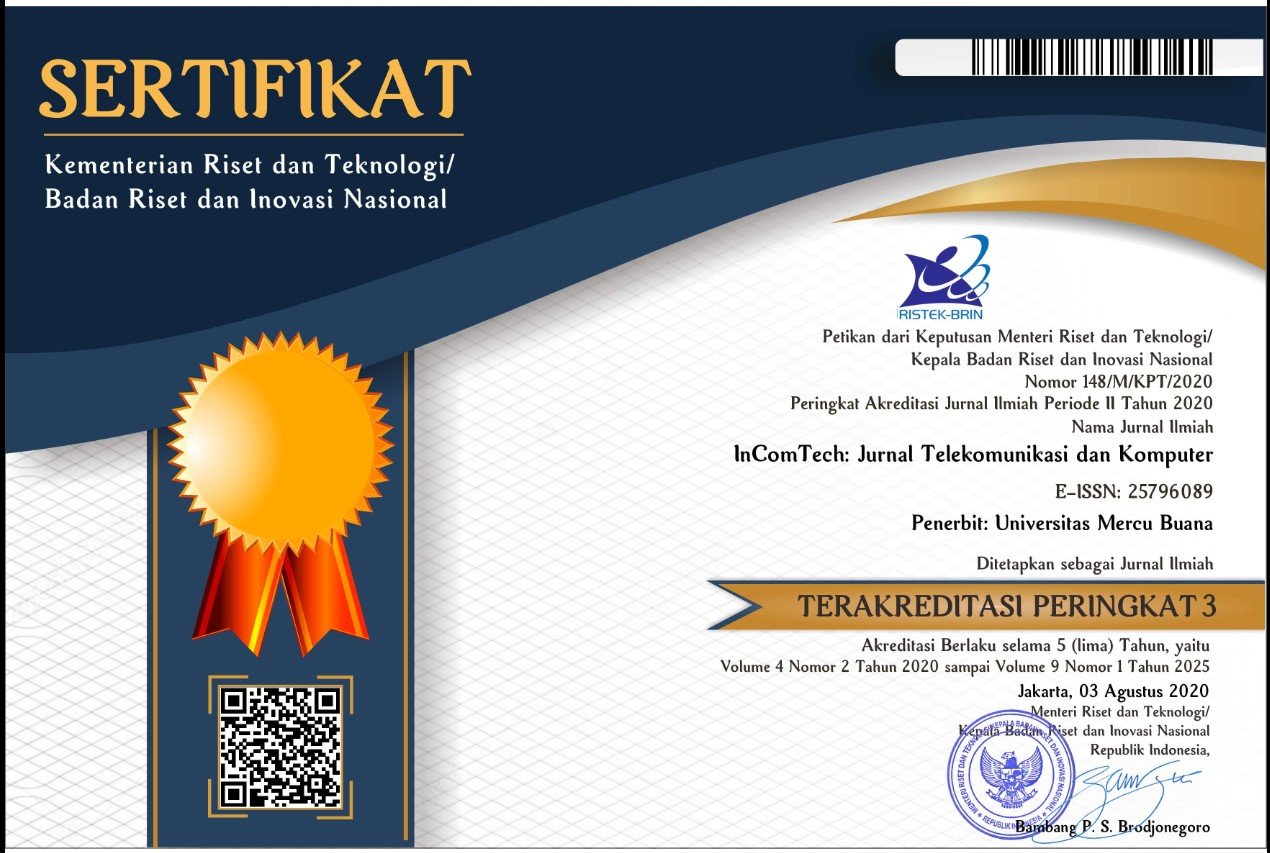Analisis Pengaruh E-Wom Dalam Membentuk Green Purchase Intention Produk Tupperware Pada Generasi Z
Abstract
Penelitian ini bertujuan untuk mengetahui dan menganalisis pengaruh Attitude, E-WOM, dan Perceived Behavioral Control terhadap Green Purchase Intention pada Generasi Z. Penelitian ini merupakan penelitian survei dengan menggunakan kuesioner untuk mengumpulkan data. Populasi dalam penelitian ini Generasi Z berdomisili di Yogyakarta. Sampel dalam penelitian ini adalah 100 responden dengan menggunakan metode purposive sampling. Teknik analisis data pada penelitian ini menggunakan analisis Regresi Linear Berganda melalui software SPSS. Hasil dari penelitian ini menunjukkan bahwa: 1) Attitude, E-WOM, dan Perceived Behavioral Control secara bersama-sama berpengaruh signifikan terhadap Green Purchase Intention, 2) Attitude berpengaruh positif dan signifikan terhadap Green Purchase Intention, 3) E-WOM berpengaruh positif dan signifikan terhadap Green Purchase Intention, 4) Perceived Behavioral Control berpengaruh positif dan signifikan terhadap Green Purchase Intention
Keywords
Full Text:
PDFReferences
Ajzen, I. (1985). From Intentions to Actions: A Theory of Planned Behavior. In J. Kuhl & J. Beckmann (Eds.), Action Control (pp. 11–39). Springer Berlin Heidelberg. https://doi.org/10.1007/978-3-642-69746-3_2
Al-Gasawneh, J. A., & Al-Adamat, A. M. (2020). The mediating role of e-word of mouth on the relationship between content marketing and green purchase intention. Management Science Letters, 1701–1708. https://doi.org/10.5267/j.msl.2020.1.010
Ali, A., & Ahmad, I. (2016). Environment Friendly Products: Factors that Influence the Green Purchase Intentions of Pakistani Consumers. Pakistan Journal of Engineering, Technology & Science, 2(1). https://doi.org/10.22555/pjets.v2i1.697
Ali, A., & Shahzad, W. (2012). Determinants of Pakistani Consumers’ Green Purchase Behavior: Some Insights from a Developing Country. 2(3).
Chen, M.-F., & Tung, P.-J. (2014). Developing an extended Theory of Planned Behavior model to predict consumers’ intention to visit green hotels. International Journal of Hospitality Management, 36, 221–230. https://doi.org/10.1016/j.ijhm.2013.09.006
Debora Indriani, I. A., Rahayu, M., & Hadiwidjojo, D. (2019). The Influence of Environmental Knowledge on Green Purchase Intention the Role of Attitude as Mediating Variable. International Journal of Multicultural and Multireligious Understanding, 6(2), 627. https://doi.org/10.18415/ijmmu.v6i2.706
Ghazali, E., Soon, P. C., Mutum, D. S., & Nguyen, B. (2017). Health and cosmetics: Investigating consumers’ values for buying organic personal care products. Journal of Retailing and Consumer Services, 39, 154–163. https://doi.org/10.1016/j.jretconser.2017.08.002
Jaini, A., Quoquab, F., Mohammad, J., & Hussin, N. (2020). “I buy green products, do you…?”: The moderating effect of eWOM on green purchase behavior in Malaysian cosmetics industry. International Journal of Pharmaceutical and Healthcare Marketing, 14(1), 89–112. https://doi.org/10.1108/IJPHM-02-2019-0017
Khaola, P., Potiane, B., & Mokhethi, M. (2014). Environmental concern, attitude towards green products and green purchase intentions of consumers in Lesotho. Ethiopian Journal of Environmental Studies and Management, 7(4), 361. https://doi.org/10.4314/ejesm.v7i4.3
Kong, W., Harun, A., Sulong, R. S., & Lily, J. (2014). THE INFLUENCE OF CONSUMERS’ PERCEPTION OF GREEN PRODUCTS ON GREEN PURCHASE INTENTION. International Journal of Asian Social Science.
Lee, K. (2008). Opportunities for green marketing: Young consumers. Marketing Intelligence & Planning, 26(6), 573–586. https://doi.org/10.1108/02634500810902839
Nielsen, N. (2014). Global Survey of Corporate Social Responsibility. [https://www.yumpu.com/en/document/view/41767220/global-corporate-social-responsibility-report-june-2014](https://www.yumpu.com/en/document/view/41767220/global-corporate-social-responsibility-report-june-2014)
Pusat Statistik, B. (2020). Presentase Penduduk Indonesia Menurut Generasi. https://databoks.katadata.co.id/datapublish/2021/05/24/proporsi-populasi-generasi-z-dan-milenial-terbesar-di-indonesia
Rahim, R. A., Sulaiman, Z., Chin, T. A., Baharun, R., & Muharam, F. M. (2016). Measuring Electronic Word of Mouth Review Adoption on Green Purchase Intention Using Source Credibility Theory. Advanced Science Letters, 22(12), 4283–4287. https://doi.org/10.1166/asl.2016.8129
Sanchez-Sabate, R., & Sabaté, J. (2019). Consumer Attitudes Towards Environmental Concerns of Meat Consumption: A Systematic Review. International Journal of Environmental Research and Public Health, 16(7), 1220. https://doi.org/10.3390/ijerph16071220
Saut, M., & Saing, T. (2021). Factors affecting consumer purchase intention towards environmentally friendly products: A case of generation Z studying at universities in Phnom Penh. SN Business & Economics, 1(6), 83. https://doi.org/10.1007/s43546-021-00085-2
Singhal, A., & Malik, G. (2021). The attitude and purchasing of female consumers towards green marketing related to cosmetic industry. Journal of Science and Technology Policy Management, 12(3), 514–531. https://doi.org/10.1108/JSTPM-11-2017-0063
Sugiyono. (2019). Metode Penelitian Kuantitatif, Kualitatif, dan R dan D. Alfabeta.
Sun, Y., & Wang, S. (2019). Understanding consumers’ intentions to purchase green products in the social media marketing context. Asia Pacific Journal of Marketing and Logistics, 32(4), 860–878. https://doi.org/10.1108/APJML-03-2019-0178
WALHI. (2013). Environmental_outlook_walhi_2013.
Wijayaningtyas, M., Handoko, F., & Hidayat, S. (2019). The millennials’ perceived behavioural control on an eco—Friendly house purchase intention. Journal of Physics: Conference Series, 1375(1), 012060. https://doi.org/10.1088/1742-6596/1375/1/012060
Zaremohzzabieh, Z., Ismail, N., Ahrari, S., & Abu Samah, A. (2021). The effects of consumer attitude on green purchase intention: A meta-analytic path analysis. Journal of Business Research, 132, 732–743. https://doi.org/10.1016/j.jbusres.2020.10.053
DOI: http://dx.doi.org/10.22441/jdm.v7i2.27680
Refbacks
- There are currently no refbacks.
Copyright (c) 2024 Jurnal Doktor Manajemen (JDM)

This work is licensed under a Creative Commons Attribution-NonCommercial 4.0 International License.
Jurnal Doktor Manajemen (JDM)
Program Doktor Manajemen - Fakultas Ekonomi dan Bisnis
Universitas Mercu Buana
Jl. Raya Meruya Selatan, Kembangan, Jakarta 11650
Tlp./Fax: +62215871335

This work is licensed under a Creative Commons Attribution-NonCommercial 4.0 International License.
View My Stats








